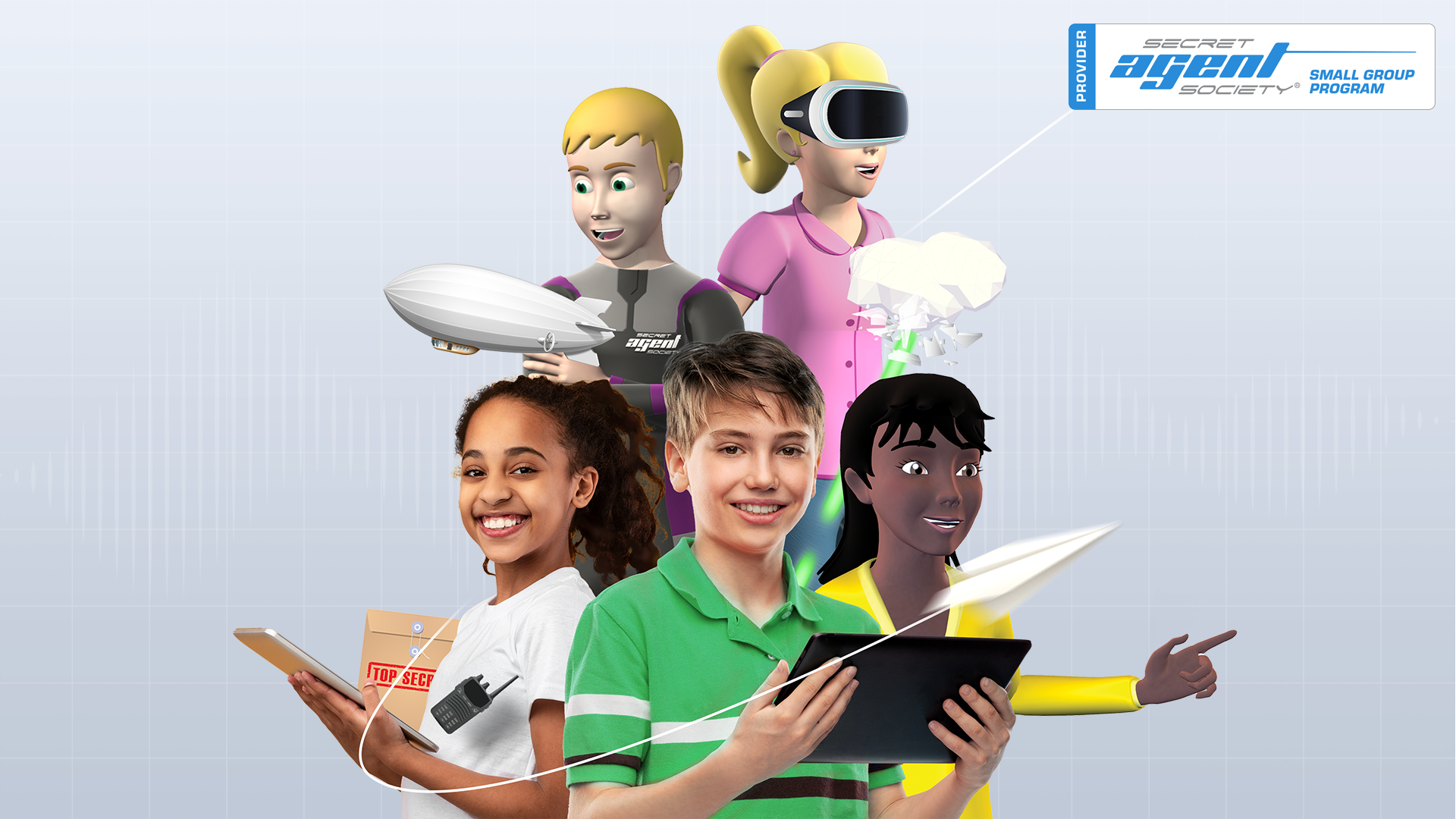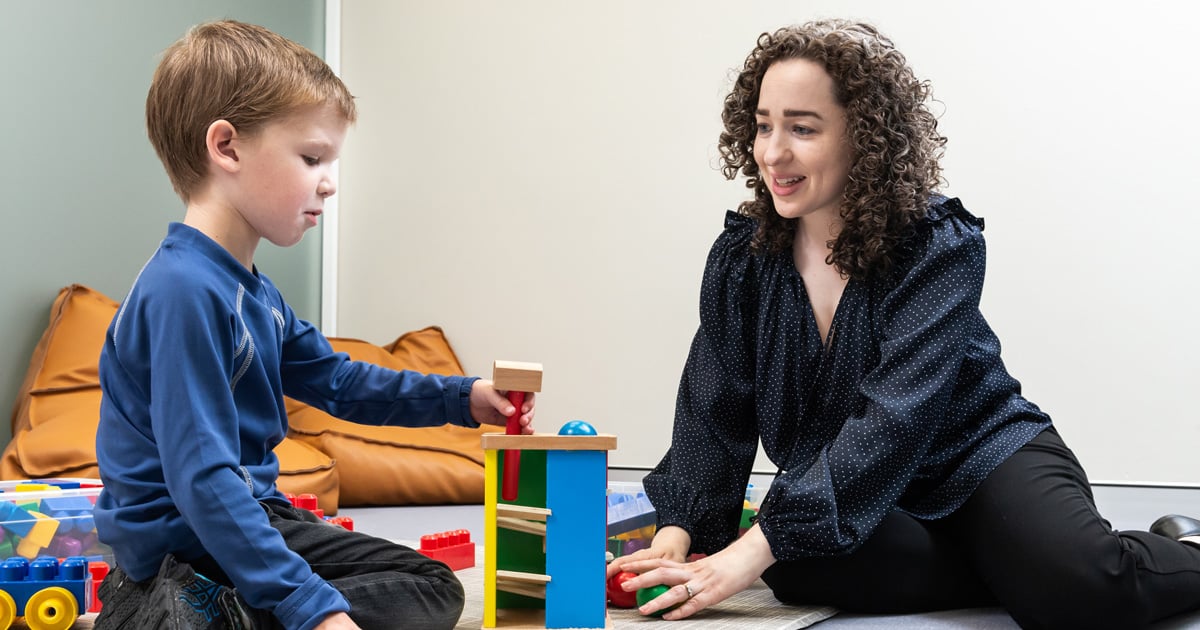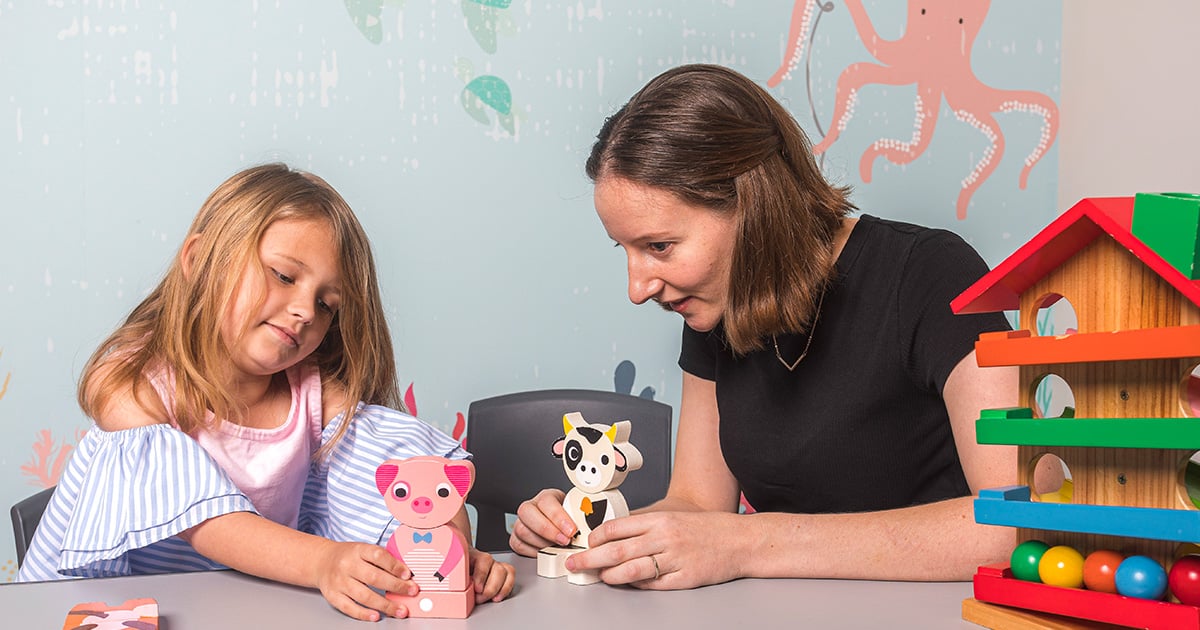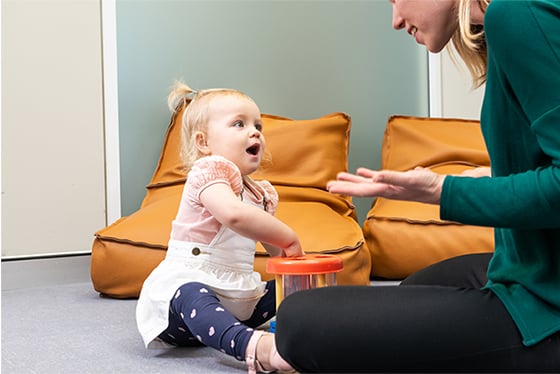CliniKids is unique in that it offers a wide range of focused therapy programs for children and babies from as young as six months.
We are excited to offer evidence-based therapies that are new to Australia.
Our focused therapy programs are listed below.
Secret Agent Society

What is the Secret Agent Society?
The Secret Agent Society (SAS) small group program helps children aged 8 to 12 years old to crack the code of emotions and friendships through an animated ‘secret agent’ theme.
The award-winning, evidence-based program prepares children for life’s social and emotional challenges in a fun and effective way. The espionage-themed program engages children's social and emotional development through gamified learning, skill generalisation, reward systems, and interactive clinician-led sessions.
Beginning as ‘Cadets’, children join regular Club Meetings guided by professionally-trained SAS Facilitators. A sophisticated and specially-designed online platform connects Cadets, their adult support network and their SAS Facilitator in a digitally-enabled wraparound approach.
At the end of the program, children graduate as ‘Secret Agents’ having learnt and practised codes and tools that focus on four key life skills:
- Emotion recognition (in self and others)
- Emotion regulation (particularly anxiety and anger)
- Social problem solving
- Social skills (for friendship and teamwork)
Who is eligible for the program?
While SAS was first developed for autistic children aged 8-12 years, the evidence base has expanded over time to demonstrate meaningful change for children with a range of diagnostic and neurodiverse profiles.
At CliniKids, the SAS small group program is delivered to children aged between 8 to 10 years and a caregiver.
SAS is delivered by experienced clinicians via telehealth or face-to-face in our clinics.
Find out more about the Secret Agent Society here.
Submit a SAS enquiryPACT - Paediatric Autism Communication Therapy
What is PACT?
Do you want to learn and understand more about how your child communicates with you and others?
Are you interested in learning how to support your child’s social learning journey?
At CliniKids, we offer a communication therapy called PACT to caregivers of children aged 18 months to 8 years who would like some additional support to understand their child’s communication signals and learn more about helpful ways to tune in, play, respond and build great communication into everyday moments.
PACT is a great early support for families who:
- May struggle to understand their child’s communication
- Have a non-verbal child and want to better understand how they communicate
- Have a child who has an autism diagnosis, or young children who may be on the pathway to an autism diagnosis (on a diagnostic waitlist or identified with early traits)
Benefits of PACT
- Long-term positive outcomes in social communication
- Improvements in a child’s social communication skills
- Helps with challenges associated with repetitive behaviour and restricted interests
- Beneficial for children across a range of communication levels
- Supports caregivers to recognise and respond to their child communication
- Supports the child’s development and self-expression
- Flexible delivery methods including telehealth or in clinic
- Backed by high-quality research
How does PACT work?
PACT – or Paediatric Autism Communication Therapy – is an evidence-based therapy which coaches caregivers to support their child’s social and communication skills through video feedback.
PACT is a fun interactive form of therapy that is engaging for both the child and caregiver. The program is strengths focused and is tailored to a family’s individual needs.
The program works in partnership with caregivers to empower them to notice and respond to their child’s communication, adapting the play, communication and social environment around the child to support their development and self-expression. This form of communication therapy supports children’s development by helping caregivers to:
- better recognise, respond to and enhance their child’s communication and interaction skills in the moment
- build ways of communicating and interacting with their child that increases engagement
The program builds on the relationship between a caregiver and their child to create and make the most of families’ everyday routines and activities, such as play and mealtimes, for communication and interaction. When caregivers have skills and strategies that they can use in their child’s natural environment, they’re better able to support their child’s development.
Discover the many benefits of PACT and how it works in this blog. Alternatively, download the flyer.
Discover the many benefits of PACT and how it works in this blog. Alternatively, download the PACT flyer.
Submit a PACT enquiryShared Book Reading Program
What is the Shared Book Reading Program?
CliniKids will soon launch a new Book Sharing Program designed to make reading with your little ones extra special.
The Shared Book Reading Program is a program for parents and carers of children who would like to build early book sharing communication opportunities.
The program was originally developed to support preschool autistic children, but is perfect for any family looking to spark joy and build early communication skills through books. Think of it as storytime with a purpose!
How does the program work?
In this program, a Speech Pathologist works directly with the caregiver using video feedback and modelling to encourage early language skills during book sharing in home environments.
Discover the many benefits of book sharing in this informative blog.
Who is the program suitable for?
The program is suitable for:
- Children with or without an autism diagnosis
- Children who can attend to a book for approximately five minute
- Families who would like to support their child with early book sharing and core-literacy skills
- How do I register interest?
Download the Shared Book Reading Program flyer
Submit a Shared Book Reading enquiryCO-OP - Cognitive Orientation to daily Occupational Performance
What is the CO-OP approach?
The Cognitive Orientation to daily Occupational Performance (CO-OP) approach is a problem-solving approach designed for children (and adults) who experience difficulties with performing the skills they want to or need to perform. The CO-OP approach guides children to independently discover and develop cognitive strategies to perform the necessary tasks of everyday living. This may involve learning how to tie your own hair, skip, handwrite, tie shoelaces, or ride a bike. CO-OP is based on theories of motor learning.
How does CO-OP work?
CO-OP is an individualised client-centred program that encourages the child to take the lead and be meaningfully involved in their own therapy sessions, including developing their own goals and plans to achieve these. The therapist uses a process of guided discovery to help the child think of their own strategies through questioning and not telling.
Who is the CO-OP approach suitable for?
At CliniKids, CO-OP is available for children aged 7 years to 10.9 years who experience motor difficulties and who are able to set their own goals, are able to problem solve and come up with their own strategies.
Watch the videoESDM – Early Start Denver Model

What is the ESDM?
The Early Start Denver Model (ESDM) is a comprehensive, evidence-based early support approach for young autistic children. The ESDM aims to promote a child’s development across all domains, including expressive and receptive language, joint attention, imitation, cognition, play and social skills, and fine and gross motor skills.
How does the ESDM work?
The ESDM utilises a range of strategies to teach a developmental curriculum to young autistic children in a naturalistic, play-based manner. In the ESDM, complex behaviours are broken down into discrete teaching steps which are taught in play and social interactions. Multiple skills are targeted in each play period by a trained clinician.
Who is the ESDM suitable for?
The ESDM has been developed to support children diagnosed with or showing early signs of autism from 12 months of age up until age 5.
Submit an ESDM enquiryJASPER - Joint Attention, Symbolic Play, Engagement and Regulation

What is JASPER?
The Joint Attention, Symbolic Play, Engagement & Regulation (JASPER) approach is a therapy approach designed for preschool and school-aged autistic children and other children who have differences in play and social communication skills.
How does JASPER work?
JASPER uses behavioural principles, along with naturalistic strategies, to teach children skills that lay the foundation for social communication. Clinicians work directly with the child through play-based sessions. The therapy involves an initial assessment, followed by 45-60 minute sessions, once per week. JASPER is usually delivered as a ‘block,’ meaning it is delivered intensively for a set time period (often three months), rather than the child receiving JASPER on an ongoing basis. The clinician uses strategies including imitating, modelling, adjusting the environment, and expanding on play routines and language to achieve goals.
Who is JASPER suitable for?
JASPER is suitable for preschool and school-aged autistic children with a range of play abilities, including children who are at an exploring level of play (e.g., banging, or mouthing toys) to those who can use pretend skills in play (e.g., pretending a block is a piece of food and feeding it to a doll, or role playing). JASPER is suitable for children who are pre-verbal, to those who speak in sentences, and is available at CliniKids up until age 8.
Submit a JASPER enquiry

